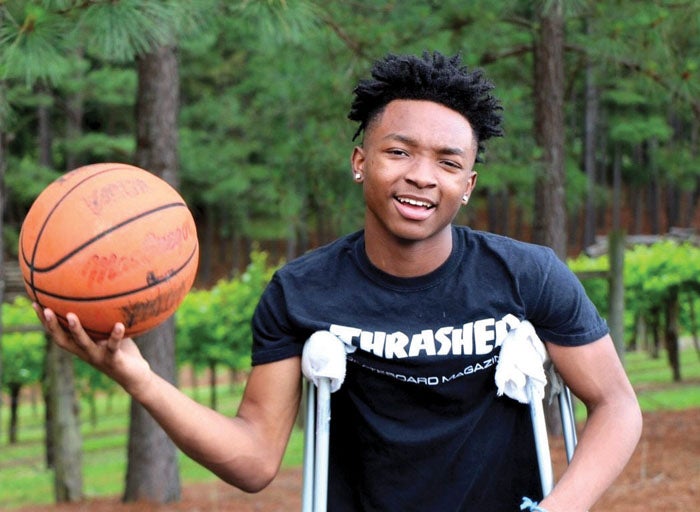What happens when your largest bone is damaged?
Published 12:00 am Thursday, July 18, 2019

- Za’Haree Maddox
|
Getting your Trinity Audio player ready...
|
Za’Haree Maddox dreams of playing college basketball.
He’s 15, talented and already drawing attention from college recruiters. But Maddox’s career came to an abrupt halt when a serious leg injury sidelined the energetic point guard for nearly a year.
Maddox, a rising sophomore at Davie County High School in Mocksville, missed his freshman seasons playing basketball and football.
“I thought, ‘What am I going to do?’ Maddox said. “I was heartbroken. It was very sad.”
He faced an arduous recovery and questions about competing at a high level on the court. But Novant Health surgeons and trainers helped Maddox return to his passion.
A mother’s eyes often can tell
Angela Holland knew something was off as she watched her son play basketball.
“Za’Haree was playing with a little limp that I’d see after he played a long period of time,” she said. “I could see it especially if he sat out then came back into the game.”
Maddox played year-round until May 2018, when his left knee swelled and the pain intensified during a tournament in Myrtle Beach. An X-ray a few days later shocked the family.
“The nurse told us to get him off his leg right now,” Holland said. “He needed to have surgery.”
Maddox’s femur (thighbone) — the longest and strongest bone in your body — wasn’t receiving adequate blood flow. That can cause bone and cartilage to break loose, causing pain and hindering joint motion. In Maddox’s case, a large fragment of bone had broken away and was barely hanging on.
In medical terms, it’s called osteochondritis dissecans.
Repair and recovery
Dr. Richard Haigler, an orthopedic surgeon at Novant Health Orthopedics & Sports Medicine — Clemmons, used several screws to reattach the loose piece back to its normal position on Maddox’s femur.
Osteochondritis dissecans occurs most often in children and teens. It can be caused by overuse and high-impact activities, such as jumping and running, which affect the joint. The condition occurs most commonly in the knee, but also in elbows, ankles and other joints.
“All of us in sports medicine see this condition,” Haigler said. “But (Maddox’s) was probably the worst case I’ve seen.”
Haigler had cadaver bone and cartilage standing by, but didn’t need to use them for Maddox’s repair. Osteochondritis dissecans is rare, estimated to occur in the knee in 15 to 29 per 100,000 individuals, according to the National Institutes of Health.
It can be caused by a traumatic incident or repetitive use of the joint, and is most often seen in athletes. Maddox didn’t have a single accident that caused it, but said his knee “had been hurting” for about six months prior, and slowly worsened.
Maddox’s surgery was in early June 2018. He wasn’t cleared to play again until April 2019, a 10-month recovery.
“I felt devastated for him because I knew basketball was his love,” Holland said. “He’s determined. He never wants to be taken out of a game. I knew he’d get back, we just didn’t know how long. After he was cleared, it was, ‘Mama, can you take me to the Y or the park?’ over and over.”
“I’m extremely proud of him. He didn’t let it get him down.”
On every trip to physical therapy, Maddox had the same question for Novant Health athletic trainer Rebecca Shomo — “When can I play ball again?”
Maddox diligently worked on weight-bearing exercises, range of motion and overall strengthening.
“I have to thank all the Novant Health doctors and therapists for their patience and expertise,” he said. “It was such a relief to get back. Wonderful. I was so happy.”
Back in the lineup
Maddox played AAU basketball this summer for Team Loaded’s 15-and-under squad. He’s training for an August return to Davie County’s football team (he’s a wide receiver). The school basketball season begins in the late fall.
Being young helped Maddox recover, compared to someone 15-20 years older, for instance. Haigler said the plan during rehabilitation was to let Maddox progress based on what he could tolerate.
“He’s done a lot better than I thought he would, given the extent of his injury,” Haigler said. “If this allows him to play a sport in college, that’s a home run.”
This school year, instead of cheering on teammates from the sidelines, Maddox will be in the middle of the action. What advice would Maddox give to a young athlete in his situation?
“Listen to your doctor,” he said. “Stay motivated and jump over every obstacle.”



